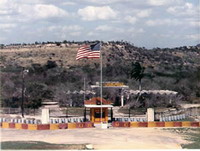15 prisoners executed in Afghanistan
Afghanistan executed 15 prisoners, thus putting an end to three years without the death penalty and drawing U.N. criticism.

The punishment also raised concerns of possible complications for NATO missions in the country.
The executions were carried out Sunday evening according to an Afghan law that requires condemned prisoners be shot dead, said prisons chief Abdul Salam Ismat.
Crimes committed by those killed included murder, kidnapping and armed robbery. Officials said no Taliban or al-Qaida fighters were among them.
Afghanistan's hard-line former Taliban regime conducted public executions, many at the war-shattered Kabul stadium. That stopped after the Taliban's ouster in late 2001.
The new government had told the international community it would halt executions. It carried out only one previously, in 2004.
The 15 deaths could complicate relationships between Afghanistan and some NATO countries with military forces operating in the country.
International troops often take militants prisoner and hand them over to the Afghan government - but some countries, like the Netherlands and Canada, might not do so if Afghanistan is known to use capital punishment.
The Netherlands called the executions "extremely unwelcome," but said Dutch troops would continue to hand over prisoners to the Afghan government. Canada abolished the death penalty in 1976.
Among those shot Sunday was Reza Khan, sentenced for adultery and the slaying of three foreign and one Afghan journalists in 2001. The four were pulled from their cars, robbed and shot near the eastern city of Jalalabad while they were driving toward Kabul six days after the Taliban abandoned Kabul following heavy U.S. bombing.
The four were Australian TV cameraman Harry Burton, Afghan photographer Azizullah Haidari of the Reuters news agency, Maria Grazia Cutuli of Italian newspaper Corriere della Sera and Julio Fuentes of the Spanish El Mundo daily.
Also executed was Farhad, known as Pahlavan, involved in the 2005 kidnapping of an Italian aid worker Clementina Cantoni.
Tom Koenigs, the head of the United Nations Assistance Mission in Afghanistan, said the U.N. has expressed its concern over the use of the death penalty many times in the past.
"The United Nations in Afghanistan has been a staunch supporter of the moratorium on executions observed in Afghanistan in recent years," Koenigs said. "I expect Afghanistan to continue working towards attaining the highest human rights standards and ensuring the due process of law and the rights of all citizens are respected."
Afghan President Hamid Karzai's spokesman, Humayun Hamidzada, told The Associated Press last week that Karzai "takes extreme care in execution cases."
"He has been holding onto these cases because he wants to make sure that the justice is served and the due process is complete. He personally does not like executions, but Afghan law asks for it, and he will obey the laws," he said.
The government's official announcement during the news hour Monday evening said Karzai ordered the executions following a decision by a special commission he had set up to review Supreme Court rulings.
"After all the discussions and after looking back over the cases ... in order to prevent future crimes, such as murders, armed robberies, kidnappings and to maintain the stability of the country, (Karzai) approved the prisoners' death sentences," a statement read over the news said.
The Dutch Foreign Ministry labeled the news "extremely unwelcome."
"For the Netherlands, the abolition of the death penalty is one of our priorities in terms of international human rights policy," said spokesman Bart Rijs. "We had understood there was a moratorium on the death penalty in force."
Rijs said the Netherlands had signed a memorandum of understanding with the Afghan government guaranteeing that the Afghan government would not execute any prisoner handed over by the Netherlands. Rijs said there are 10 such prisoners and all are believed to be in good health.
"We don't see cause to change the detention policy of the Dutch in ISAF," he said.
London-based human rights group Amnesty International said six countries were responsible for 91 percent of all known executions worldwide last year: China, Iran, Iraq, Pakistan, Sudan and the United States. Eighteen other countries also carried out executions, Amnesty said.
Subscribe to Pravda.Ru Telegram channel, Facebook, RSS!





